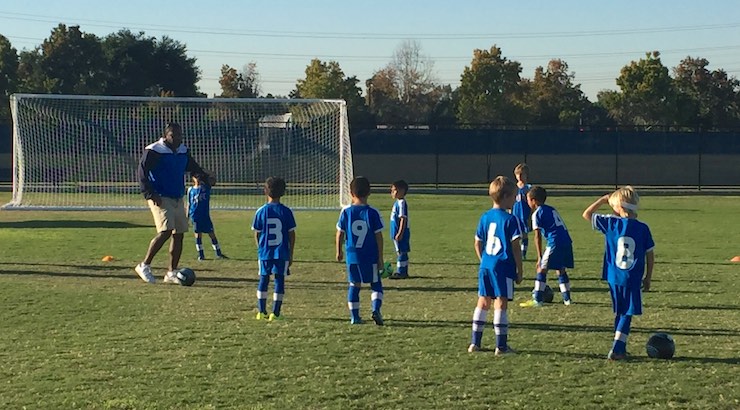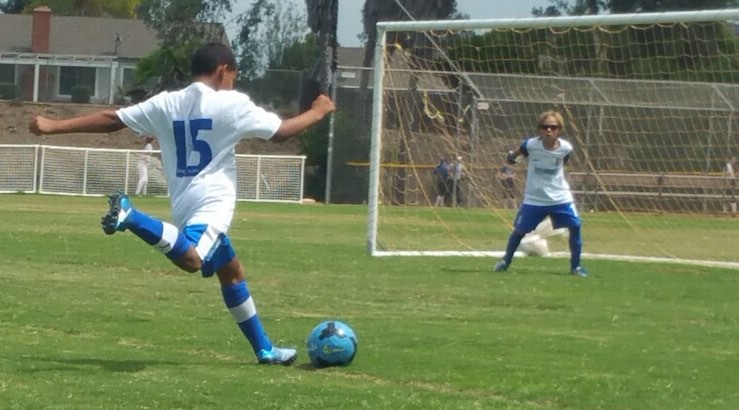Being A Good Soccer Parent – Words of Advice From A Soccer Coach Who Is A Soccer Parent
One youth soccer coach speaks up on the eternal conflict and the complexities of being both a parent and a soccer coach. Here is a unique perspective from the view point of a soccer coach who is also a soccer parent and is on the sideline for a second time around. Written by Chris Sydney.
It is hard not to be the coach of my son’s team and be a parent who coaches…. As a parent of kids who play soccer, I find myself in constant internal turmoil between the parent and the coach in me.
Currently my wife and I have two boys — 7 years old and 9 years old — and both play soccer. Our daughter, who is now a junior in High School, played youth soccer for may years but has now fallen in love with volleyball.
My wife and I are part of the new generation of soccer parents who grew up playing the beautiful game.”
We have played soccer throughout our lives; all the way to the collegiate level. My wife played at the University of Portland for the legendary Clive Charles and even playing a few semi-pro seasons post college. I played at Grand Canyon University.
Having been a youth soccer coach since graduating college in 1999, I have been able to create a good portfolio of opportunities for myself in the soccer world. I have an A license from the United States Soccer Federation (USSF) and I have been able to work with various age groups and both genders.
 As a coach, I believe it is our responsibility to not only train and develop the player, but also educate the parent on the demands of the game.
As a coach, I believe it is our responsibility to not only train and develop the player, but also educate the parent on the demands of the game.
As a coach, I want to share the passion, commitment and love of the game. The key factor is educating the parent on how to support their youth player in their soccer adventure. The goal is to allow the player to use their own ideas and allow the coach to be the guide on their soccer journey.
Let The Coach Do The Coaching!
Good coaches do an excellent job coaching youth players because they understand how to separate how kids see the game and from how the parent does.
A good coach helps parents eventually understand how to support the player without intervening in the development process the coach has set up. As we all know, the process of developing youth soccer players takes time and depends upon the individual player. The kid, parent and coach are all involved in the process.
The question to myself is: how long does this process take for a parent who is also a coach?
In the past few years it has become apparent to me that I am now on the other side of the conversation.
Now, when I stand on the sidelines of my sons’ soccer games, I realize my experience as a coach has made this process somewhat easier.
You see, the first time around with my 16 year old daughter did not end so well. Upon evaluating our experience or lack of experience, I now know how to start off on a better footing with my boys.
Don’t Coach Your Own Kids
The first adjustment we have made is not to name ourselves coaches to our sons’ teams. With our daughter, we coached her teams. Our talents as coaches served the other kids on her team well but not our own kid.
My daughter explained to us that she was constantly held to a higher standard than everyone else and she just wanted to be a player like everyone else on the team.
Here is where the toughest part of the process for me comes in. I am not the coach of my son’s team and I’m a parent who coaches.
How do I just be a parent on the field when — post playing career — I have always been the coach on the field?
This is where my new field of study has taken me. How to be a supportive parent who loves his kids and just want to be there to see them enjoy their soccer experience without any coaching from the coach side of me?
Here is what works for me so I can become the supportive parent I want to be:
Prior to the game I tend to disengage with my boys so as to allow them to pay full attention to their coach. By this time they are in full kit with enough water for the game. I put them in the care of the coach and take up a position as a spectator.
My boys are not always starting but when they do I give them a “good luck” or “have fun” shout before the first whistle.
Once the game starts, I usually tend to stand away from the other parents or with my wife. This ensures that I keep any opinion to myself and that I can not be called upon to interpret decisions by coaches or officials because I am a coach.
I try to remember that my kid can see me from the field and read my body language — I tend to stay quiet as much as I can so as not to interrupt them while they are playing. I understand the power of my communication (voice, hand gestures, body language,) with kids, so I do not want to use that power to disturb their experience. Sometimes I position myself where my kids can not see me easily but I can see the game.
I try to rehearse in my head the things I will say to my boys before I say it. This means that praise could come a few seconds delayed as to ensure the strict criteria of praise/support is adhered to and not a coaching point.
Upon completion of the game I try to ask questions like: Did you have a good time? Was the game fun? Or I will sometimes start off with “That game looked like a lot of fun today!”
 These initial questions are usually followed up by kids telling me what they would like to do next or what they want for dinner /lunch. Dissecting the game and their performance never seems to be their first desire.
These initial questions are usually followed up by kids telling me what they would like to do next or what they want for dinner /lunch. Dissecting the game and their performance never seems to be their first desire.
Every coach who is a parent is different, but for me, these tips help. My main objective is to make sure that my kids have their own quality experience with their coaches and teammates — just like I did when I played as a youngster.
It should be uninterrupted by dad or moms’ thoughts of what should have been done if we were the coach or what was the right decision to be made if we were the player on the ball.
I am not the finished product yet but my aspirations are to be the best supportive dad to my kids in whatever field that they choose to partake in.
I believe that my voice and ideas will not be the borders of their creative thinking process and expression. My support and silence will be the stool upon which they climb to make their own decisions.
Who knows, that stool may turn into a ladder for my grand kids.






